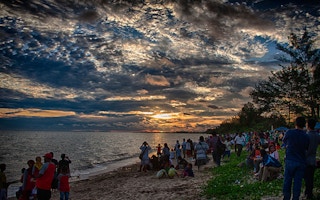Indonesia’s Minister of Maritime Affairs and Fisheries Susi Pudjiastuti has publicly pledged to intervene in the case of Pulau Bangka, a tiny island off the northeastern tip of Sulawesi where residents have been attempting to block the development of an iron ore mine.
The minister promised immediate help in settling the dispute with mining company PT Migroko Metal Perdana (MMP), a local subsidiary of Hong Kong-based Aempire Resource Ltd.
Citizens’ groups have won several court cases against PT MMP and the officials that support its activities on Bangka, but the company continues to operate on the island and a court verdict calling for its license to be revoked has not been executed by the local government.
Following a meeting with activists from Bangka in late September, Pudjiastuti promised to raise the matter with Indonesian president Joko Widodo. “I will make a summary of this meeting and submit it directly to the president. I will ask for the issue to be settled without delay,” she said.
What future for Bangka?
Pulau Bangka lies in the heart of the “Coral Triangle” a global hotspot for marine biodiversity. The island’s approximately 2,700 residents traditionally made a living from fishing, cashew and coconut cultivation and, more recently, from tourism.
Although Bangka is less well known—and less well protected—then the nearby Bunakan National Marine Park, visitors rave about “out-of-this world diving” among coral gardens teeming with life.
Under a 2007 law, Indonesia’s small islands and their surrounding waters are supposed to be prioritised for either national defense or eco-friendly activities like conservation, education and training, research and development, aquaculture, tourism and sustainable fishing.
At just 48 square kilometers (18.5 square miles), Bangka easily fits under the 2,000 square kilometer threshold by which the law defines a “small island.”
“
I will ask for the issue to be settled without delay.
Susi Pudjiastuti, minister, Maritime Affairs and Fisheries
In 2008, the head of the North Minahasa district, Sompie Singal, granted PT MMP a permit to explore Bangka for mineral resources, insisting that mining would bring economic benefits to the island. The permit, which has twice been extended and expanded, grants the company a concession that covers nearly half the island.
In January 2012, a group of residents and tourism operators sued to have the mine’s permit revoked, citing the 2007 law governing small islands. They feared a large iron mining operation would destroy the island’s ecosystem, its fisheries and its nascent tourist industry.
Their lawsuit was rejected by the Manado Administrative Court in August 2012. The residents’ group then appealed to the High Administrative Court in Makassar, which in March 2013 ruled in their favor: the verdict revoked both the PT MMP’s original exploration permit and its extensions.
The case went all the way to the Supreme Court in Jakarta, which dismissed PT MMP’s appeal in September 2013; the Makassar’s court’s ruling in favor of island residents would stand.
Despite these legal setbacks, the North Minahasa district head gave PT MMP permission to begin preliminary mining activities, and began pushing for a change in the island’s long-term spatial development plan.
In 2014, outgoing Minister of Energy and Mineral Resources Jero Wacik – an infamous politician currently serving a four-year prison sentence for graft — granted an operations permit to the mining company.
This prompted yet another case by Bangka residents and tour operators, suing Wacik for violating the Supreme Court’s ruling. The islanders won that case, too, but that has not been enough to stop PT MMP’s work on the island.
Jull Takaluing, director of local NGO Yayasan Nurani Minahasa said the island is suffering from deforestation and infilling of mangroves in PT MMP’s work area, and many locals are alarmed about the islands’ future prospects.
Villagers and fishermen have attempted to physically block ships from unloading heavy equipment at the PT MMP work site, and mine workers allegedly accosted a group of foreign tourists diving near the PT MMP concession.
This story was published with permission from Mongabay.com. Read the full story.










